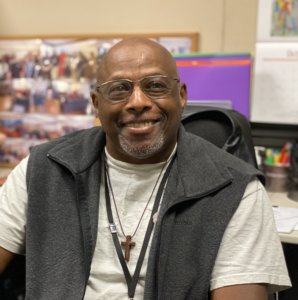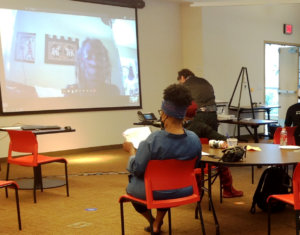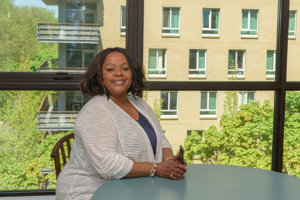This content block does not have a preview.
Looking for more information about Flip the Script?
Visit the program page or check out the latest blog post!
This content block does not have a preview.
In the wake of the murder of George Floyd by police in Minneapolis and the resulting uprisings in cities across the country, many Black communities and communities of color are experiencing and processing an intense time of collective trauma.
But with COVID-19, ongoing restrictions on gatherings pose a barrier to providing spaces for Black, Indigenous and people of color to reflect on their experiences and share support.

Flip the Script’s Advocacy Coordinator, Billy Anfield.
For CCC’s Flip the Script team and their clients, this is a critical need. The program serves Black clients recently released from prison with community reintegration through access to housing, health care, employment and culturally informed peer support. Because of their histories of incarceration, Flip the Script clients are especially likely to have had traumatic experiences with law enforcement.
When Flip the Script participants said they needed a place to discuss what was going on in the community, to process their experiences with police violence and to explore their power to promote change, the team took action. Billy Anfield, Flip the Script’s advocacy coordinator, started calling clients to invite them to an online discussion.
“In the first four calls, we ended up crying on the phone,” Anfield said. The conversations were intense, bringing up recent and historical trauma for the clients— and Anfield, too.
“I was reflecting on things that happened to me at ten years old. I couldn’t make any more calls,” said Anfield. At such a critical moment, the need for personal connection was greater than ever.
So instead of meeting online, Flip the Script coordinated a series of in-person gatherings that would be as safe as possible, with physical distancing and face masks to reduce transmission risk. The first session was an outlet for program participants to share their anger, fear, frustration and hurt.
“We all needed to let the steam out of the pot,” Anfield said.

The Flip the Script advocacy group shared concerns with Portland City Commissioner Jo Ann Hardesty about police violence in Portland and advocated for more culturally informed parole monitoring, lower barriers to housing for people with criminal records, and better mental health care in prison and after release, among other issues.
By the second meeting, the group was ready to identify opportunities for action— and they were well prepared for it. Prior to the pandemic, Flip the Script members had formed an advocacy group — facilitated by Anfield and CCC’s public policy team, Mercedes Elizalde and Gary Cobb — that identified issues important to them and developed a policy agenda. In addition to opposing police violence, that agenda now includes increasing access to housing and home ownership for people with criminal records, improving mental health and substance use disorder treatment after release from prison, and establishing culturally responsive parole and probation supervision. And now Flip the Script is ready to advocate for it.
When a Flip the Script advocacy group member recently testified to city commissioners about the importance of digital inclusion for all Portlanders, the power of his testimony piqued Commissioner Jo Ann Hardesty’s interest. Hardesty asked to meet with the advocacy group, and did so virtually on July 18. Group members have asked other policymakers to meet with them as well, including newly elected district attorney Mike Schmidt, Senator Lew Frederick and others. They are pushing for a louder voice within CCC, too. “I love that they have accepted their role as advocates,” said Anfield.

Medina Kurney, the new Associate Director of Re-entry Services, met with the Flip the Script advocacy group to discuss new directions for the program. With the arrival of Kurney, a longtime CCC employee pictured here in 2019, people of color now lead Flip the Script at every level.
Flip the Script sees change on the horizon. In addition to the ongoing work of the advocacy group, they are welcoming Medina Kurney as Associate Director of Re-entry Services for Flip the Script and the Stabilization Transition and Parole Transition programs. With the addition of Kurney, Flip the Script will be led by people of color at every level. “We are in the starting blocks and ready to move,” Anfield said.